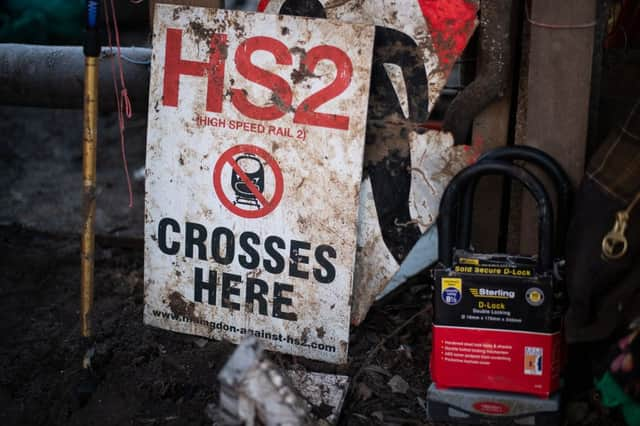Where will HS2 serve, and when will the high-speed railway track be operational?


Under HS2, journey times will be dramatically slashed and once complete, it could treble the number of passengers between London, Birmingham, Manchester and Leeds.
But to do that, a whole lot of new track and rail infrastructure must be built along the route.
Advertisement
Hide AdAdvertisement
Hide AdThe HS2 project includes 345 miles of track to link London and Birmingham, with connecting routes to Manchester, the East Midlands and Leeds, which has led many living along the route to worry about the impact the line's construction will have on their lives.
Not only that, but once the service is up and running, trains are expected to travel at 250 mph - faster than any operating speed in Europe - with as many as 14 services running every hour.
Here's everything you need to know:
What is the route?
The city centres of London, Birmingham, Manchester, and Leeds will all be connected by HS2, which is is expected to carry over 300,000 passengers a day – around 100 million a year, when fully operational.
HS2 will directly serve:
-Birmingham Curzon Street
- Carlisle
- Chesterfield
- Crewe
- Darlington
- Durham East Midlands Hub (Toton)
- Edinburgh
- Glasgow
- Interchange (Solihull)
- Lancaster
- Leeds
- Liverpool
- Lockerbie
- London Euston
- Manchester Airport
- Manchester Piccadilly
- Newcastle
- Old Oak Common
- Oxenholme
- Penrith
- Preston
- Runcorn
- Sheffield Midland
- Stafford
- Warrington
- Wigan
- York
You can use this HS2 interactive map to see routes in more detail.
Advertisement
Hide AdAdvertisement
Hide AdFollowing the completion of the various phases, the journey time from London to the Lake District will be cut to under two hours, with trains arriving at Oxenholme. A journey from London to Scotland's central cities will be just over three-and-a-half hours.
London to Birmingham will take 49 minutes instead of the current 1 hour 21 minutes and passengers will be able to travel from London to Sheffield in 87 minutes, compared to the existing fast service of 120 minutes.
London to Warrington will be possible in just over an hour, making access to Liverpool and Manchester airports easier. Wigan will open up too, with trains to Birmingham lasting just 35 minutes and Wigan to London in just over 80 minutes.
Phase one of HS2 connects London and the West Midlands, cutting through Buckinghamshire. Stations affected will be Birmingham Curzon, London Euston, Old Oak Common, Oxenholme, Penrith and Stafford.
Advertisement
Hide AdAdvertisement
Hide AdPhase 2a connects the West Midlands and Crewe, affecting the stations of Crewe, Liverpool, Manchester Airport, Manchester Piccadilly, Preston, Runcorn and Wigan.
Phase 2b is the Y-shaped part of the journey which will connect Crewe to Manchester and the West Midlands to York and Leeds. Stations affected will be Chesterfield, Carstairs, Glasgow, Lockerbie, Edinburgh, Carlisle, Darlington, Durham, Toton, Lancaster, Leeds, Newcastle, Sheffield, and York.
When will it be finished?
The project is divided into three parts: Phase 1, Phase 2a and 2b, and was originally hoped to be finished by 2033.
HS2 Ltd, the government-owned company running the project, once said said phase one would be completed by late 2026, with planning starting in 2009.
Advertisement
Hide AdAdvertisement
Hide AdHowever, trains are now not due to start running on HS2 between London and Birmingham until 2029, with many vocal opposition leaders claiming there is little prospect of that happening before 2031, with high-speed trains not reaching Manchester and Leeds until 2040.
The first stretch of line between London and Birmingham, will now not be fully operational until 2031, HS2 chairman Allan Cook announced last year.
And the second phase, between Birmingham and Crewe, will open between 2028 and 2031 rather than in 2027 as previously planned.
The final stage, extending HS2 to Manchester and Leeds, will not be finished until 2040 - seven years later than planned.
Advertisement
Hide AdAdvertisement
Hide AdMr Cook said the total budget would be £78 billion in 2015 prices, compared to the previous estimate of £56 billion.
How much is it costing?
The price tag for the HS2 network was originally set at £55bn back in 2015, but now it is being claimed that the cost of building the high-speed rail is "out of control" and the benefits of it are being exaggerated.
That's according to the the deputy chair of the project's review panel - Lord Berkeley - who said the line, which is being constructed to link London to the north of England, is likely to end up costing the Government more than £108nn.
The Labour peer, who is a vocal critic of HS2, said he believes the Commons has been "misled" about the price of the project.
Advertisement
Hide AdAdvertisement
Hide AdHe alleges that he, and other members of the review panel, were prevented from having any input into the final draft of the report because the review was "effectively terminated" on 31 October 2019.
He went on to claim that the Government-backed report has been "unduly influenced" by HS2 promoters. Lord Berkeley further accuses HS2 Ltd and the Department for Transport of failing to properly co-operate with the review - something HS2 Ltd categorically denies.
For more information on HS2 and the impact its construction could have on your life, head to hs2.org.uk